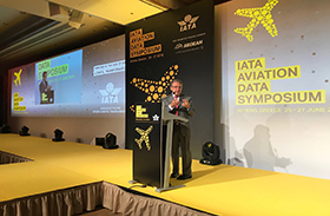
Athens – The International Air Transport Association (IATA) urged aviation stakeholders to embrace data and digital transformation to help deliver a frictionless customer experience while enhancing safety and efficiency.
“We must transform paper-based and legacy processes into digital ones and use data to drive decision-making in all facets of our business. Organizational silos will need to be shed to ensure a holistic focus on the entire customer experience. And we will need to do all this while continuing to ensure the highest levels of safety, security and environmental sustainability,” said Alexandre de Juniac, IATA’s Director General and CEO.
In remarks delivered to the IATA Aviation Data Symposium, de Juniac focused on three building blocks to achieving success:
- Develop core data science capabilities and use data to drive safety and operational improvements
“The statistics tell us that despite yearly fluctuations, the long-term trend is toward improving safety. Nevertheless, we must intensify our efforts to ensure the accident rate remains disconnected from the expected doubling in air traffic demand over the next 20 years. Greater use of data will be critical to these efforts,” said de Juniac.
He cited IATA’s Global Aviation Data Management (GDM) program as an example. “GADM captures data from more than 470 different industry participants, through accident and incident reports, ground damage occurrences and flight data. This supports a proactive data-driven approach for advanced trend analysis and predictive risk mitigation.”
De Juniac also pointed to IATA’s Turbulence Aware initiative. “Using data already being collected by aircraft systems, Turbulence Aware will help airlines avoid turbulence, resulting in a decline in turbulence-related injuries, reduced fuel burn and improved operational efficiencies.
- Use modern data standards and technology to deliver a superior customer experience
“Today we are on the cusp of a digital transformation with the New Distribution Capability (NDC) and ONE Order. These programs, based on modern standards, will liberate the industry from a century of accumulated legacies and deliver a much-needed modernization of distribution and back office processes. They will usher in a world of airline retailing that will drive value for the customer, airlines and the entire air travel value chain,” said de Juniac.
NDC offers enhanced distribution with a modern XML-based data standard for communications between airlines and travel agents. ONE Order replaces legacy processes built around e-tickets, passenger name records, and electronic miscellaneous documents, with a single retail, customer-focused order.
Turning to airport processes, de Juniac highlighted the One ID initiative to re-invent the passenger journey with a document-free process based on identity management and biometric recognition. “This will boost efficiency from check-in to boarding—to the benefit of passengers, airports and the control authorities,” said de Juniac.
- Establish robust data governance towards suppliers and providers
“Modern aircraft generate enormous amounts of data that can be analyzed to monitor operating efficiency and reliability. While original equipment manufacturers (OEMs) generally agree that airlines own the raw data produced by their aircraft, they have taken steps to make it difficult for airlines to utilize this data. We are engaging with the OEMs on behalf of our members on this issue,” said de Juniac.
Additionally, often airlines do not have information about customers who do not book directly with the airline that would enable them to more easily contact these customers in the event of operational disruptions. This information resides in third-party booking systems. “I hope we can agree that delivering a frictionless travel experience requires that the value chain be able to pro-actively manage disruptions and deliver a personalized experience to our shared customer. And that requires access to passenger information,” said de Juniac.
Read Alexandre de Juniac’s speech
For more information, please contact:
Corporate Communications
Tel: +41 22 770 2967
Email: corpcomms@iata.org
Notes for Editors:
- IATA (International Air Transport Association) represents some 290 airlines comprising 82% of global air traffic.
- You can follow us at twitter.com/iata for announcements, policy positions, and other useful industry information.
